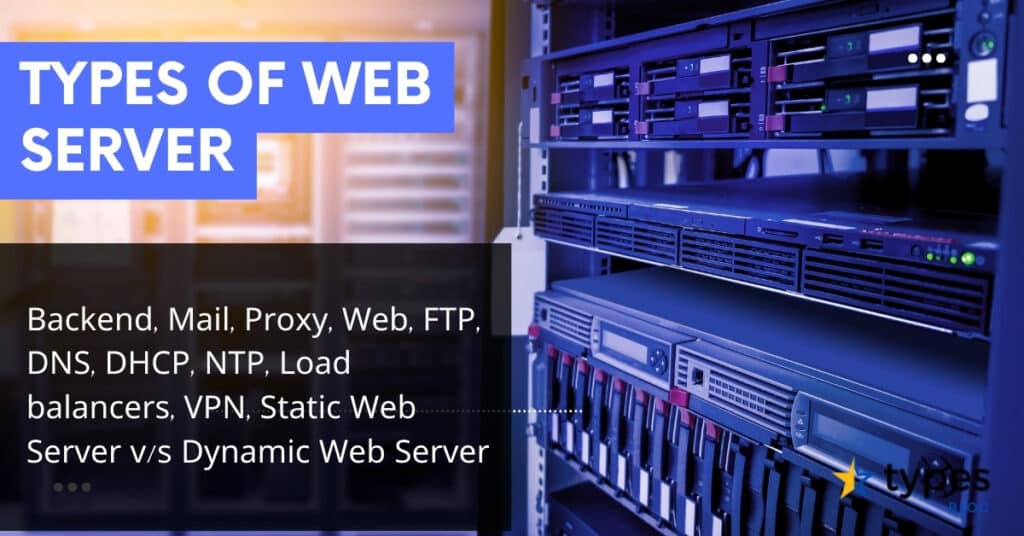
Introduction to Web Servers
Overview
A Web server is a computer that is responsible for hosting and serving websites to users across the internet. It is always connected to the internet and has a unique address made up of a series of numbers, known as an IP address. There are several different types of Web servers available in the market, each with its own features and capabilities. In this article, we will explore some of the most prominent Web server types.
Apache HTTP Web Server
Developed by the Apache Software Foundation, the Apache HTTP Web Server is one of the most popular Web Servers in use today. It is an open-source server software that is widely known for its stability, security, and flexibility. Apache supports a wide range of operating systems and is highly extensible, with a vast number of modules and add-ons available for customization.
Internet Information Services (IIS) Web Server
The Internet Information Services (IIS) Web Server is developed by Microsoft and is the default Web server for Windows operating systems. It provides a robust and secure platform for hosting websites, with features such as advanced authentication, SSL/TLS encryption, and centralized management through the IIS Manager. IIS also supports ASP.NET and other Microsoft technologies.
Lighttpd Web Server
Lighttpd, also known as “Lighty,” is a lightweight and fast Web server that is designed for high-performance websites. It excels in handling concurrent connections and static content, making it suitable for serving static files or proxying requests to dynamic backend servers. Lighttpd is known for its low memory usage and efficient resource management.
Sun Java System Web Server
The Sun Java System Web Server, now known as the Oracle iPlanet Web Server, is a robust and feature-rich Web server that is designed for enterprise deployments. It supports multiple operating systems and integrates well with the Java development platform. The Sun Java System Web Server offers advanced features such as load balancing, clustering, and failover capabilities.
Jigsaw Server Web Server
Jigsaw Server is an open-source Web server that is developed by the World Wide Web Consortium (W3C). It is designed to be highly modular and extensible, allowing developers to customize its functionality. Jigsaw supports HTTP/1.1 and other web protocols, and it also includes a powerful debugging and logging framework.
LiteSpeed Web Server
LiteSpeed Web Server is a high-performance Web server that offers advanced features and optimizations for improved speed and efficiency. It is known for its compatibility with Apache, allowing users to seamlessly switch from Apache to LiteSpeed without making any code changes. LiteSpeed also provides features such as LSCache for accelerating dynamic content and HTTP/3 support.
Node.js Web Server
Node.js is a runtime environment that allows developers to run JavaScript code on the server-side. It can be used as a Web server by leveraging modules such as Express.js. Node.js excels in handling concurrent connections and is ideal for building real-time applications or APIs. It has a large and active community, with a vast ecosystem of modules available for extending its functionality.
In summary, Web servers play a crucial role in delivering websites to users across the internet. There are various types of Web servers available, each with its own strengths and capabilities. Whether you choose Apache, IIS, Lighttpd, or any other Web server, it is important to consider factors such as performance, security, and compatibility with your specific requirements. By selecting the right Web server, you can ensure that your website is fast, secure, and reliable for your users.
Importance and Role of Web Servers in Website Hosting
Web servers are essential components of website hosting as they are responsible for hosting and serving websites to users across the internet. They are always connected to the internet and have unique IP addresses that allow them to be accessed by users. Different types of web servers are available in the market, each offering its own set of features and capabilities.
In conclusion, web servers are vital for hosting websites and serving them to users over the internet. There are various types of web servers available, each offering unique features and capabilities. It is important to consider factors such as performance, security, and compatibility when selecting a web server for your specific requirements. By choosing the right web server, you can ensure that your website delivers a fast, secure, and reliable experience for your users.
Apache HTTP Server Web Server
The Apache HTTP Server is a widely recognized and highly popular web server utilized by many websites around the world. Developed by the Apache Software Foundation, it is an open-source server software that offers remarkable stability, security, and flexibility. The Apache HTTP Server is compatible with a wide range of operating systems and is highly customizable through its vast library of modules and add-ons.
In conclusion, The Apache HTTP Server is a reliable and feature-rich web server that offers superior stability, flexibility, and performance. Its extensive customization options and compatibility with various operating systems make it a trusted choice for hosting websites. Whether you are looking for a secure server, scalability, or ease of use, the Apache HTTP Server stands out as a top-notch solution. Its wide adoption and active community support further reinforce its reputation as a leading web server in the market.
(IIS) Web Server
The Internet Information Services (IIS) Web Server is a popular web server developed by Microsoft. It is widely used for hosting websites on Windows-based systems and offers a range of features and advantages.
- Integration with Windows: As a Microsoft product, IIS is tightly integrated with Windows operating systems, providing seamless compatibility and easy configuration.
- User-friendly Interface: IIS offers a user-friendly interface with a comprehensive dashboard, making it straightforward to manage and configure the server.
- Performance Optimization: The web server includes features such as dynamic caching and compression to enhance website performance and improve response times.
- Security: IIS provides robust security features, including support for SSL/TLS encryption, request filtering, and access control, to ensure the confidentiality and integrity of web communications.
- Scalability: IIS can handle high traffic loads and offers features such as load balancing and clustering to ensure optimal performance and scalability.
- Application Support: The server supports various programming languages and frameworks, including ASP.NET, PHP, and Node.js, making it suitable for a wide range of web applications.
In conclusion, the Internet Information Services (IIS) web server is a feature-rich and widely used server software option for hosting websites and applications on the Windows operating system. With its seamless integration with the Windows ecosystem, advanced security features, and optimized performance, IIS offers a robust and reliable solution for organizations looking to host their web applications. Whether it’s compatibility, security, or performance optimization, IIS stands out as an excellent choice for Windows-based hosting environments.
Lighttpd Web Server
Lighttpd Web Server, also known as “lighty,” is an open-source web server that is designed and optimized for high performance and speed-critical environments. It offers flexibility, security, compliance, and speed, making it a popular choice for hosting websites and applications.
In conclusion, Lighttpd Web Server is a highly flexible, secure, and performance-oriented web server that is suitable for speed-critical environments. With its robust security features, efficient resource usage, and scalability, Lighttpd is a great choice for hosting websites and applications. While considering web server options, it is essential to evaluate specific requirements and preferences to make an informed decision. Lighttpd’s focus on performance and flexibility makes it a strong contender in the web server market.
Jigsaw Web Serve
Jigsaw Web Server, also known as “Jigsaw,” is an open-source web server developed by the World Wide Web Consortium (W3C). It is written in Java and designed to be a platform for experimental protocols and applications. Jigsaw focuses on providing a modular and extensible architecture for web servers.
In conclusion, Jigsaw Web Server offers a modular and extensible architecture for experimental protocols and applications. Its features include HTTP/1.1 compliance, proxy and caching capabilities, and support for collaborative publishing. While Jigsaw may not have the same level of performance and scalability as other widely-used web servers, its focus on experimentation and research makes it a valuable tool for developers and researchers in the web technology field. The choice between Jigsaw and other web servers ultimately depends on the specific requirements and objectives of the project.

Explanation of expensive yet popular web servers
Netscape’s iPlanet
Netscape’s iPlanet is a highly sophisticated web server that offers advanced features and robust security. It is designed for enterprise-level applications that require scalability, reliability, and extensive customization options. However, iPlanet is considered expensive due to its enterprise-grade capabilities and comprehensive support services.
Bea’s Web Logic
Bea’s Web Logic is a leading web server specifically designed for Java-based enterprise applications. It provides excellent scalability, high availability, and comprehensive management capabilities. Web Logic offers advanced features such as clustering, failover, and load balancing, making it an ideal choice for large-scale deployments. However, its advanced functionality and extensive support make it one of the more expensive options in the market.
IBM’s WebSphere
IBM’s WebSphere is a robust and highly scalable web server that is widely used in enterprise environments. It offers extensive capabilities for building and deploying web applications, including support for Java, J2EE, and web services. WebSphere provides advanced features such as workload management, clustering, and transaction management, making it suitable for mission-critical applications. However, its comprehensive functionality and enterprise-level support drive up the cost.
While these web servers are more expensive compared to the open-source options, they offer additional features, enterprise-grade support, and enhanced security. They are specifically designed for large-scale deployments and mission-critical applications, where reliability, scalability, and comprehensive functionality are paramount. Therefore, organizations that require extensive customization, robust security, and dedicated support may consider investing in these expensive yet popular web servers.
It is important for organizations to carefully evaluate their requirements and budget constraints before deciding on a web server. Factors such as performance, scalability, security, compatibility, and cost should be taken into consideration. With a wide range of options available in the market, developers can find the right web server that suits their specific needs and aligns with their budget.
Factors to consider when selecting a web server
- Performance: Performance is a crucial factor to consider when selecting a web server. It determines how quickly and efficiently web pages are processed and delivered to users. It is important to choose a web server that can handle high traffic loads and deliver content quickly to ensure a smooth user experience.
- Scalability: Scalability is another important factor to consider. As a website grows and attracts more traffic, the web server should be able to handle the increased workload. It is essential to choose a web server that can easily scale up or down based on the website’s needs without compromising performance.
- Security: Security plays a vital role in protecting a website and its users’ data. When selecting a web server, it is important to consider the security features it offers. Look for web servers that provide robust security features such as SSL/TLS encryption, firewalls, and intrusion detection systems. Protecting sensitive user data and preventing unauthorized access should be a top priority.
- Compatibility: Compatibility is essential to ensure a seamless development and deployment process. When selecting a web server, developers should ensure that it is compatible with the programming languages, frameworks, and databases they are using. Compatibility issues can hinder the functionality and performance of a website, so it is crucial to choose a web server that aligns with the technology stack being used.
- Cost: Cost is an important consideration for any organization. When selecting a web server, evaluate the cost of purchasing and maintaining it, along with any additional licensing fees or support costs. It is important to find a balance between cost and features that align with the specific requirements of the website.
- Support: The level and quality of support provided by the web server vendor are crucial for website uptime and minimizing potential downtime. Look for vendors that offer comprehensive documentation, troubleshooting guides, and responsive customer support. Having reliable support can help resolve any issues that may arise and ensure the smooth operation of the website.
Conclusion
Choosing the right web server is a critical decision for web developers as it directly impacts the performance, security, and functionality of their websites. By considering factors such as performance, scalability, security, compatibility, cost, and support, developers can make an informed decision that aligns with their specific requirements. While expensive web servers like Netscape’s iPlanet, Bea’s Web Logic, and IBM’s WebSphere offer advanced features and comprehensive support, they may not be suitable for every website or budget. It is essential to carefully evaluate the needs of your website and choose a web server that provides the necessary performance, scalability, security, and support within your budget constraints.
Recap of the different types of web servers
- Apache: Apache is the most popular and widely used web server software. It is an open-source server that is known for its stability, flexibility, and scalability. Apache supports a wide range of operating systems and is compatible with various programming languages and tools.
- Nginx: Nginx is a lightweight and high-performance web server that is often used for serving static content, reverse proxying, and load balancing. It is known for its efficient handling of concurrent connections and low memory usage.
- Microsoft Internet Information Services (IIS): IIS is a web server software developed by Microsoft for use with its Windows operating systems. It offers integration with other Microsoft products and provides robust performance, security, and scalability.
- Litespeed: Litespeed is a commercial web server that is designed for high-performance websites. It is known for its efficient use of server resources, advanced caching capabilities, and support for HTTP/3.
- Google Web Server (GWS): GWS is a proprietary web server developed by Google for its own use. It is designed to handle high traffic volumes and deliver content quickly. GWS is known for its reliability and scalability.

Choosing the right web server is crucial for the success of your website.
Here are some key points to consider:
- Performance: The performance of a web server plays a vital role in determining the speed and responsiveness of your website. Apache, Nginx, IIS, Litespeed, and GWS are all known for their high performance and efficiency in handling concurrent connections.
- Scalability: As your website grows, it’s important to have a web server that can scale to accommodate the increasing traffic and resource demands. All the web servers listed above offer scalability options, allowing your website to handle high traffic volumes effectively.
- Security: Website security is of utmost importance to protect sensitive data and user information. Apache, Nginx, IIS, Litespeed, and GWS all prioritize robust security features to safeguard your website from potential threats.
- Compatibility: Consider the operating system and programming languages you plan to use for your website. Apache and Nginx offer wide compatibility with various operating systems and programming languages. IIS is specifically designed for use with Windows-based systems, while Litespeed and GWS also support a wide range of operating systems.
- Cost: While Apache and Nginx are free and open-source, IIS is included in Windows operating systems, making it a cost-effective option for Windows users. Litespeed requires commercial licensing, and GWS is a proprietary web server utilized by Google within their services.
- Support: Active community support is crucial for troubleshooting and keeping your web server up-to-date. Apache and Nginx have dedicated open-source communities that provide ongoing support and updates. IIS offers support from Microsoft, while Litespeed and GWS have commercial support available.
In conclusion, when selecting a web server, it’s essential to assess factors such as performance, scalability, security, compatibility, cost, and support based on the unique needs of your website. Apache, Nginx, IIS, Litespeed, and GWS each have their strengths and considerations. Understanding these aspects will help you make an informed decision that aligns with your website’s goals and resources. Prioritize choosing a web server that can handle your website’s traffic, ensure its security, and provide reliable performance for an optimal user experience.
